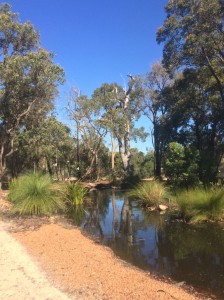
The unique elasticity makes a rubber membrane the best choice for lining in ponds. Southland Pond Liners are not affected by UV light, temperature or age. They resist compressive loads and movements in the ground. The material reverts to its original form without being weakened or becoming thinner. As the rubber does not contain plasticisers or other additives that can be leached out, it will not shrink, lose weight or become brittle. The membrane also has a unique ability to adapt itself to the substrate.
Click here for our step by step guide on the process of installing a pond liner
Buy pond liners online now at Southland’s online shop
More about ponds…


Southland Pond Liners are chemically stable when coming into contact with chemicals in the soil and other materials. They withstand root penetration and rodent attack.
The membrane is made to measure and can be supplied with prefabricated penetrations for pipes and cables. In larger installations, gas and high groundwater should be drained away from the ground. Sharp stones and roots should be removed, and a layer of sand laid on the bottom bed. The rubber membrane should be protected by a geotextile. For small garden ponds, a 0.75 mm thick membrane is sufficient. In public areas and large aquatic environments, a thickness of 1 mm is recommended. The bottom of the pond is covered with coarse gravel, macadam or possibly crushed red brick.
For areas up to 600 m2, Southland Pond Liners can be supplied as a single panel and be installed by the building owner or general contractors. For larger areas that require splicing on site, an installer authorised by Southland Liners should be engaged

Click below for our step by step guide on the process of installing your own pond liner
Or if you’d like some inspiration
There are many creative water feature concepts being used all around Australia. From fish ponds, koi farms, fountains, to natural swimming pools and frog ponds
EPDM FOR HYDROPONICS

Southland supplies EPDM for hyrdoponic applications – both big and small. EPDM is the preferred material for agricultural applications.

There are many online resources that can help the home gardening enthusiast establish their own vegetable bounty.


